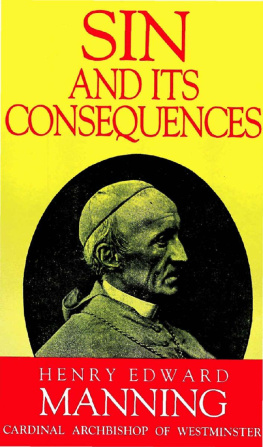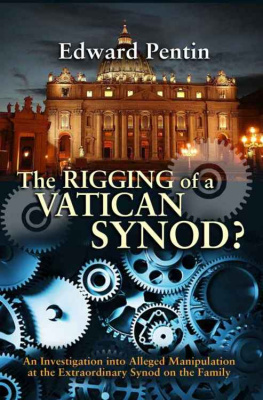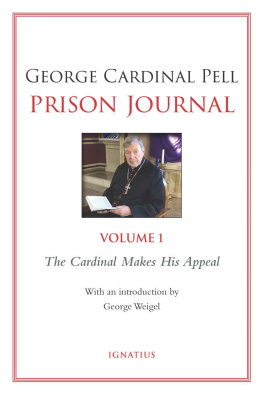Cardinal Henry Edward Manning - Sin and Its Consequences
Here you can read online Cardinal Henry Edward Manning - Sin and Its Consequences full text of the book (entire story) in english for free. Download pdf and epub, get meaning, cover and reviews about this ebook. year: 2015, publisher: TAN Books, genre: Science. Description of the work, (preface) as well as reviews are available. Best literature library LitArk.com created for fans of good reading and offers a wide selection of genres:
Romance novel
Science fiction
Adventure
Detective
Science
History
Home and family
Prose
Art
Politics
Computer
Non-fiction
Religion
Business
Children
Humor
Choose a favorite category and find really read worthwhile books. Enjoy immersion in the world of imagination, feel the emotions of the characters or learn something new for yourself, make an fascinating discovery.
- Book:Sin and Its Consequences
- Author:
- Publisher:TAN Books
- Genre:
- Year:2015
- Rating:3 / 5
- Favourites:Add to favourites
- Your mark:
- 60
- 1
- 2
- 3
- 4
- 5
Sin and Its Consequences: summary, description and annotation
We offer to read an annotation, description, summary or preface (depends on what the author of the book "Sin and Its Consequences" wrote himself). If you haven't found the necessary information about the book — write in the comments, we will try to find it.
Sin and Its Consequences — read online for free the complete book (whole text) full work
Below is the text of the book, divided by pages. System saving the place of the last page read, allows you to conveniently read the book "Sin and Its Consequences" online for free, without having to search again every time where you left off. Put a bookmark, and you can go to the page where you finished reading at any time.
Font size:
Interval:
Bookmark:
Sin and its
Consequences
Henry Edward
Manning
Originally published by Burns & Oates, London, and Benziger Bros., New York. Later reprinted by P. J. Kenedy, New York. No date was given on either edition.
This edition was edited and revised by TAN Books in 1986 from the P. J. Kenedy edition.
Copyright 1986 by TAN Books
ISBN: 0-89555-299-X
Library of Congress Catalog Card No.: 86-50420
TAN Books
Charlotte, North Carolina
www.TANBooks.com
1986
"But they that commit sin and iniquity, are enemies to their own soul ."Tobias 12:10
"Flee from sins as from the face of a serpent: for if thou comest near them, they will take hold of thee. The teeth thereof are the teeth of a lion, killing the souls of men. All iniquity is like a two-edged sword, there is no remedy for the wound thereof."Ecclesiasticus 21:2-4
"But if the wicked do penance for all his sins which he hath committed, and keep all my commandments, and do judgment and justice, living he shall live, and shall not die. I will not remember all his iniquities that he hath done: in his justice which he hath wrought, he shall live."Ezechiel 18:21-22
CONTENTS
Sermon I
THE NATURE OF SIN
" It is expedient for you that I go: for if I go not, the Paraclete will not come unto you; but if I go, I will send him to you; and when he is come, he shall convince the world of sin ."John 16:7-8
Since last Lent began, how many souls that were gathered here have passed into eternity. And before another Lent begins, how many will stand before the Great White Throne. Who among us shall be the first to go to judgment? Let us, therefore, enter upon this Lent as if knowing it to be our last; let us begin this time of conversion to God as if we were sure that another would never be granted to us. "Bring forth, therefore, fruits worthy of penance, for now the axe is laid to the root of the tree; every tree, therefore, that bringeth not forth good fruit is hewn down, and cast into the fire." ( Matt . 3:8, 10).
These thoughts have made me choose a subject, sad indeed and severe in all its parts, but vital to every one of us, necessary for our salvation, the root and foundation of allI mean sin, its nature, its effects, its consequences. And I have chosen this subject because there can be none other so necessary, and because the precept of the Church, binding us all to Confession and Communion at Easter, begins more urgently to warn the conscience of every member of the Catholic Church. I therefore appeal to you all. I appeal to your conscience to fulfill, each one of you for yourselves, this duty of salvation; and not for yourselves alone. Fathers and mothers, warn your families and households; friends and neighbors, warn with humility and charity all whom you know to be neglecting the practice of their duty to God.
The words of our Divine Saviour reveal to us what is the work and office of the Holy Ghost: "He shall convince the world of sin." Both in the old creation and in the new, both before the Incarnation of the Son of God and after His Ascension into Heaven, it has been, and it is, and it will be to the end of the world, the work and the office of the Holy Ghost to convince the world of sin; that is to say, to convince the intellect, and to illuminate the reason of man to know and to understand what sin is; and also to convict the consciences of men, one by one, of their sinfulness, and to make them, each one, conscious that they are guilty before God. This is the office of the Holy Ghost; and in all time, from the beginning of the world, the Holy Spirit of God has illuminated and convinced the intellect and the conscience of men to know God and themselves, and thereby to understand in some degree the nature of sin. But the fullness of that light and illumination was reserved unto the day of Pentecost, when the Holy Ghost came in person to dwell forever in the Mystical Body of Christ.
In the beginning, when God made man, He made him sinless, and He gave him the light of the Holy Spirit; so that man knew God, His holiness and perfections; and he knew himself, and the nature in which God had created him. He knew the law of God; but he did not know sin, because as yet the law had not been broken. He could not know it, because he had as yet no experience of the transgression of the law, with its bitterness and its fatal consequences; but when man sinned against God, then all was changed. Then he was conscious of his guilt, and strove to hide himself from the face of his Maker; but he only hid God from his own conscience. He could not escape from the presence nor from the eye of God; but he could hide the light of God's presence from himselfand this he did. Therefore, from the beginning of time, God in His mercy, by the working and light of His Spirit, taught men to know, in some measure at least, His own perfections and their own sinfulness; but it was only like the twilight preceding the noonday. We are in the noonday; and if in the noonday we are blind to the perfections of God and to our own sinfulness, woe to us in the day of judgment.
Therefore, my purpose is to begin by the most general outline of what sin is, and to lay down certain broad but simple principles which I shall have to apply hereafter in our future subjects. I therefore purpose first to speak of the nature of sin, of what it is, and of certain distinctions of sin, which will be necessary for us hereafter to refer to.
I. First, then, what is sin? There are many definitions of it, and one is this: it is the transgression of the law. "Sin is the transgression of the law." ( 1 John 3:4). God is a law to Himself; His perfections are the law of His own nature; and God wrote upon the conscience of man, even in the state of nature, the outline of His own perfections. He made man to know right from wrong; He made him to understand the nature of purity, justice, truth and mercy. These are perfections of God, and on the conscience of man the obligations of this law are written. Every man born into the world has this outline of God's law written upon him, and sin is the transgression of that law. Another definition of sin is: any thought, word, or deed contrary to the will of God.
Now, the will of God is the perfection of God Himselfholy, just, pure, merciful, true; and anything contrary to these perfections in thought, word, or deed is sin. The conformity of man to the will of God, to the perfections of God, is the sanctity or the perfection of the human soul; and the more he is conformed to the will of God, the holier and more perfect he is. Therefore, to be at variance with God is to be deformed; and the monstrous deformity of the human frame is not more humbling nor more hideousnay, it is not humbling and hideous, compared with the deformity of the soul. When the soul is unlike to God, when it is departed from the perfection of God, when instead of purity there is impurity, instead of justice there is injustice, instead of truth there is falsehood, instead of mercy there is cruelty, instead of the perfections of God there is the direct contrary of those perfections: no deformity or hideousness that can strike the eye is so terrible.
The malice, then, of sin consists in this, that it is a created will in conscious variance with the uncreated will of God. God made us to His own image and to His own likeness; He gave us all that He could bestow upon us. He could not bestow upon us His own nature, because that is uncreated, and no creature can partake of the uncreated nature of God; but God could bestow, and He did by His omnipotence with His mercy, bestow upon us His likeness, His image, an intelligence and a will, a heart and a conscience, so that we become intelligent and moral beings. The malice of sin consists, then, in this: that an intelligent creature, having a power of will, deliberately and consciously opposes the will of its Maker. The malice of sin is essentially internal to the soul. The external action whereby the sinner perpetrates his sin adds, indeed, an accidental malice and an accidental increase of wickedness; but the essence, the life of the malice, consists in the act of the soul itself.
Next pageFont size:
Interval:
Bookmark:
Similar books «Sin and Its Consequences»
Look at similar books to Sin and Its Consequences. We have selected literature similar in name and meaning in the hope of providing readers with more options to find new, interesting, not yet read works.
Discussion, reviews of the book Sin and Its Consequences and just readers' own opinions. Leave your comments, write what you think about the work, its meaning or the main characters. Specify what exactly you liked and what you didn't like, and why you think so.












